Audi 80 Tire Pressure
Most common recommended tire pressure for Audi 80 is 32 psi based on year of production, trim and OEM tire size, but it maybe different for older models. It is imperative to confirm the exact tire inflation for your Audi 80 to ensure safety on the road. Always refer to your vehicle owner's manual for the correct tire pressure designated by vehicle's manufacturer.
Select your Audi 80 production year to see its recommended tire inflation.
| Model Year | Front Tires | Rear Tires |
|---|---|---|
| 1992 Audi 80 | 32 psi | 32 psi |
| 1991 Audi 80 | 32 psi | 32 psi |
| 1990 Audi 80 | 32 psi | 32 psi |
Recommended Tire Pressure for Audi 80
Maintaining the recommended tire pressure for an Audi 80 is crucial for several reasons, encompassing safety, performance, and efficiency. Proper tire inflation is essential for optimal traction, which directly impacts the vehicle's handling characteristics and braking efficiency, thereby playing a significant role in driver and passenger safety. Over or under-inflated tires can lead to uneven tire wear, resulting in a shorter lifespan for the tires and necessitating more frequent replacements, which can be costly. Furthermore, tires inflated to the manufacturer's recommended pressure level contribute to the Audi 80's fuel efficiency. Correct tire pressure ensures that the vehicle has a stable and even contact with the road, reducing rolling resistance and, consequently, improving fuel economy. Additionally, maintaining the advised tire pressure supports the structural integrity of the tires, preventing damage that could lead to dangerous situations like blowouts. For the Audi 80, adhering to the specific tire pressure guidelines provided by Audi not only prolongs the life of the tires and ensures the vehicle operates at its designed performance level but also upholds the safety standards and efficiency, underlining the importance of regular tire pressure checks and adjustments as part of routine vehicle maintenance.

All listed guides, data and/or calculations are for informational purposes only. TirePressure.com does not warrant or make any representations regarding the accuracy of or the results of the use of this information. Always refer to vehicle owner's manual for the correct tire pressure configuration.